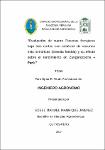Evaluación de cuatro poaceas forrajeras bajo tres en estiércol de vacunos más lombrices (Eisenia foetida) y su efecto sobre el rendimiento en Zungarococha - Perú
Abstract
El presente trabajo de investigación se realizó en el proyecto Vacunos de la Facultad
de Agronomía (Fundo de Zungarococha), de la Universidad Nacional de la Amazonía
Peruana en el cual brindamos un alcance sobre la
evaluación de cuatro Poaceas forrajeras bajo tres cortes con estiércol de vacunos
más lombrices (Eisenia foetida) y su efecto sobre el rendimiento en Zungarococha –
Perú. Se emplearon 4 poaceas forrajeras y teniendo como referencia especies que
son adaptados ya a la zona. Las evaluaciones fueron realizadas a la octava semana
después de la siembra vegetativa en matas, en parcelas de 3.6 m2 de área y 141.1
m2 de área total, establecidas en un suelo Ultisol. El diseño estadístico utilizado fue
un Diseño de Bloque Completamente al Azar (D.B.C.A.), los tratamientos en estudio
fueron: T1 (Pennisetum sp, acceso verde), T2 (Pennisetum sp, acceso morado),
T3 (Panicum máximum cv. Tanzanea) y T4 (Pennisetum sp, Maralfalfa), los
resultados, para rendimiento que son altura de planta, materia verde y materia seca
del presente trabajo de tesis demostró en los tres cortes el T1 (Pennisetum sp.
acceso verde), los mejores resultados como son para el primer corte en altura de
planta de 1.28 metros, materia verde de 3.05 Kg/m2 y materia seca de 0.63 Kg/m2;
para el segundo corte en altura de planta de 1.46 metros, materia verde de 3.51
Kg/m2 y materia seca de 0.75 Kg/m2; para el tercer corte en altura de planta de 1.57
metros, materia verde de 3.85 Kg/m2 y materia seca de 0.88 Kg/m2, esto nos
demuestra que a medida que se va realizando los cortes las plantas van
enraizándose mejor y las matas incrementa su diámetro es hace que incremente el
rendimiento de forraje de tallos verdes y hojas. En lo que respecta al porcentaje de
cobertura el tratamiento T3 (Pannicum máximum cv. “Tanzanea”), mostro al primer
corte de 83.75%, The present research work was carried out in the Vacunos project of the
Faculty of Agronomy (Zungarococha Fund), of the National University of the
Peruvian Amazon in which we provide a
Evaluation of four Poaceae forage under three cuts with manure of more cattle
worms (Eisenia foetida) and its effect on yield in Zungarococha - Peru. Four
fodder poaceae were used and with reference to species that are already
adapted to the area. The evaluations were carried out at the eighth week after
vegetative planting in forests, in plots of 3.6 m2 of area and 141.1 m2 of total
area, established in an Ultisol soil. The statistical design used was a
Completely Randomized Block Design (DBCA), the treatments under study
were: T1 (Pennisetum sp, green access), T2 (Pennisetum sp, purple access),
T3 (Panicum maximum cv. Tanzanea) and T4 (Pennisetum sp, Maralfalfa), the
results for yields that are plant height, green matter and dry matter of the
present thesis work showed in the three cuts T1 (Pennisetum sp. Green
access), the best results as they are for the first cut in plant height of 1.28
meters, Green matter of 3.05 kg / m2 and dry matter of 0.63 kg / m2; For the
second cut in plant height of 1.46 meters, green matter of 3.51 kg / m2 and
dry matter of 0.75 kg / m2; For the third cut in plant height of 1.57 meters,
green matter of 3.85 kg / m2 and dry matter of 0.88 kg / m2, this shows us that
as the cuts are made, the plants are rooting better and the forests increase
their Diameter is that it increases the forage yield of green stems and leaves.
Regarding the coverage percentage, the T3 treatment (Pannicum máximum
cv. "Tanzanea"), showed the first cut of 83.75%
Collections
- Tesis [665]
The following license files are associated with this item:


